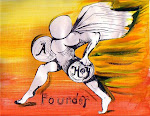Subscribe to:
Post Comments (Atom)
skip to main |
skip to sidebar

Thank you to Ana, at Hella Heaven

Another thank you to Ana
"Mais je n'ai pas peur" - La Complainte du Partisan (Anna Marly)
Passionate Blogger Award

Thank you to Ana, at Hella Heaven
Most Inspirational Blog

Another thank you to Ana
Out Of Print DVDs on Amazon
Editorial Policy and the Right to Reply
It's Quite An Experience ("IQAE") is fully committed to open discourse and transparency. The right to reply is a fundamental tenet of this belief. The facility provided on this site is limited only by language including but not limited to that which is foul, abusive, defamatory, vexatious, boring, provocative, inconsequential or intemperate, or language that in IQAE's judgment transgresses any criminal statutory provisions (for example, inciting terrorism, etc).
With this in mind, there are only two rules, on this blog:
1) Don't post anonymously (instant deletion), which includes linking to blogs that are not yours, giving phoney logons, etc;
2) If you're not known to me, state your objective. Failure to do this will result in instant deletion.
Matt
With this in mind, there are only two rules, on this blog:
1) Don't post anonymously (instant deletion), which includes linking to blogs that are not yours, giving phoney logons, etc;
2) If you're not known to me, state your objective. Failure to do this will result in instant deletion.
Matt

.jpg)




11 comments:
Matt,
I can see the video, but click on it and it says no longer available?
(Partially) remedied. I don't like this version as well - it's not as atmospheric as the other one, but still...
Matt
wow i think when i was 19 i was a little more atmospheric too LOL.
Hmmm. That other live version has been withdrawn, too. I like this, though. Nicely done.
Matt
How many versions you think we're gonna have to watch? LOL
why do you consider this genius?- words, music, thought?
Ah! An interesting question! Well, if one accepts that words are merely an extension of thought, indeed, if one accepts, as I do, that Descartes' conception of duality was pretty accurate, then anything that we say or do is merely an extension of the way that we think, and thought is the basis of anything "original". Indeed, it may be the only "real" thing.
We're probably all capable of genius, then, but there are many other factors involved in whether or not our genius is acknowledged, not least others' fear that they may be "left behind;" whether or not the thing that we have conceived is of value to others; and whether, within society as it is currently structured, a person is entitled to have their genius acknowledged (ie, are they regarded as being sufficiently powerless, such that their ideas may be stolen, without recourse).
Elvis Costello is a genius, as far as I'm concerned, because he takes what he sees around him, and expresses that in musical terms in a novel way. Clearly, he's a technically accomplished musician, but he's able to take what he has been taught and deliver something original, whether that be in terms of the subject matter that he deals with, (one can't be more novel than to write an ode to the Hoover Factory), or the way that he deals with it. He's never really written a love song, if you've noticed - such love songs as he has written (eg, Alison, All This Useless Beauty or Sulky Girl), are bittersweet. He has a very particular outlook on life, and it is anything but formulaic. He's not trying to break the mould - he doesn't have to try, I think. In fact, if you've ever seen him interviewed, it's seems pretty clear that for him, it's "normal" to be that good. He's become that good for a reason, and it's got nothing to do with the attendant adulation, I think. What the reason is, I have no idea, but he probably does.
Matt
Do you wonder if society ideal of 'genius' is ever understood?
LOL. Not by me, it's not!
It all looks very confused, to me. First, we have the objective assessment of genius (150+ IQ). Now, I've done an IQ test, and scored 156, although, to be fair, I did get bored when I realized that I wasn't going to complete it in the allotted time, so I just ticked "C" for the remaining thirty-odd questions!). Presumably, then if one doesn't score 150+, one is not a genius.
However, let's say that my score, say, was validated and is a correct interpretation of my ability to see a pattern (which is all IQ tests test, I think). We're then left to ask what on earth the point is in being a genius? It's not enough, then, to be intelligent, within the narrow paramaters of an IQ test; one must also conduct oneself such that one has unusual (positive) value for somebody else. And even that is not enough, I suspect (ie, "getting the job done" will not be sufficient for one to be valued).
So, one must score 150+, apply one's intelligence such that it is productive in the opinion of somebody (a kol (deliberately in lower case)), and one must be sufficiently "likeable," such that people feel motivated to acknowledge your ability. We then have to delve into what people regard as "productive" and "likeable"!
That all seems very complex and pointless, to me!
Matt
Yes, it then pushes the 'genius' into a society issued box of performance expectations, which can diminish the purity of the 'genius' thoughts, ideals, ideas, which then takes away the exact reason the 'genius' benefits society at large. Those who keep to their own thoughts and do what they do naturally, are the ones who have not fallen into the box society wants them in for performance and with regard to expectations. Then it goes to the extreme where many 'genius' have been categorized by society as probable mentally ill people, ie those lists of "famous people with mental illness"; so in fact society in the end got them into the box it had to do, that places them above everyone else where they were to begin with--brilliant and remarkable, and thought about long after they are dead. It's why museums are full of 'genius' and brilliant pieces of art and it's why we have musicians, authors, etc. and society often cannot handle pure genius.
Yes, people love a box to cram people into, don't they, or a label to stick on them. If we acknowledge them as far better than we are in the intellect stakes, then we have to find something reaaaaaally wrong with them, to balance things out!
Matt
Post a Comment